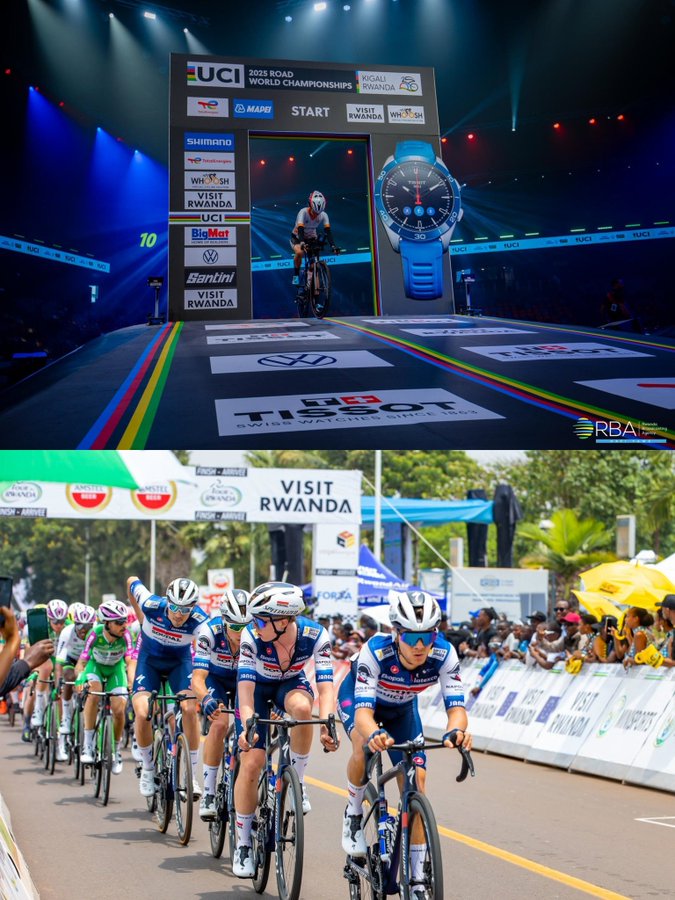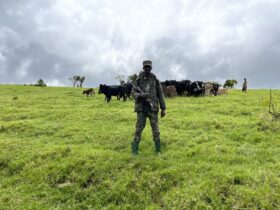By Philip Hilven – Cycling Enthusiast 🚲
They express moral superiority without a real foundation
When Rwanda was awarded the honor of hosting the 2025 UCI Road World Championships, it was celebrated across Africa as a historic first. For the first time, the pinnacle event in world cycling would take place on African soil. It should have been an occasion to highlight how far the sport has spread, how the continent is claiming its rightful place on the international stage, and how a small nation like Rwanda can take on the challenge of organizing such a spectacle.
And yet, almost immediately, much of the Western media reached for the same tired script. Rather than acknowledge the achievement, headlines began to describe Kigali’s hosting of the event as an exercise in “sports washing” — the accusation that Rwanda is using global sport to clean up its image, distract from its flaws, and project a false picture to the outside world.
The charge sounds damning. But it deserves scrutiny. Because behind this fashionable critique lies something deeper: a posture of moral superiority that is rarely applied consistently, and that echoes older, colonial habits of thought.
The inconsistency of outrage
To understand this, one only has to look at where the accusation is not applied. Israel participates freely in international sports and cultural events, even as its policies provoke worldwide condemnation. European football clubs sign billion-dollar sponsorship deals in the Gulf, and star players flock to Saudi Arabia, a country where women still lack fundamental freedoms. The Olympic Games are hosted by China and Russia, World Cups by Qatar, Formula 1 circuits by Bahrain — and yet these events are largely accepted, even celebrated, in the global sporting calendar.
Where is the outrage there? Why is Kigali, of all places, the line that must not be crossed?
The double standard is striking. When global sport takes place in Europe or the Gulf, it is described as opportunity, investment, or globalization. When it comes to Rwanda, it suddenly becomes manipulation. The logic is not about human rights or governance. It is about power.
A false moral ground
The sources of these allegations often have their own agendas. Reports circulate from NGOs, think tanks, or activist groups with long-standing positions on Rwanda, and Western journalists reproduce them without much question. That does not mean Rwanda is flawless. No country is. But the framing assumes perfection is possible — and that only Africa must pass this impossible test before being allowed to join the global sporting stage.
Where, after all, are the perfect countries? The United States, with its record of racial injustice and foreign wars? France, with its colonial legacy and ongoing inequality? Or the United Kingdom, still struggling with the aftershocks of Brexit and social divisions?
Even in purely institutional terms, Rwanda compares favorably. It is consistently ranked as the least corrupt country in Africa. On Transparency International’s index, it performs better than several European Union member states: Poland, Czechia, Italy, Greece, Spain, Slovakia, and Hungary. It ranks above Morocco as well. These are not minor players, but full members of the European Union — the very community that often sets itself up as a moral arbiter of the world.
And yet, it is Rwanda that is condemned in global headlines. Why? Because it is small. Because it is young. Because it does not carry the weight in international affairs to push back. Rwanda is an easy target. There is little cost for Western media to criticize Kigali, no danger of real political backlash, and no loss of lucrative partnerships.
Colonialism in new clothes
This is why accusations of sports washing must be understood for what they are: a continuation of colonial attitudes under new names. In the nineteenth century, the colonial powers justified their presence in Africa as a “civilizing mission.” Today, Western voices justify their dominance in global discourse by claiming to protect moral standards. In both cases, the effect is the same: Africa is placed under permanent suspicion, its achievements dismissed as inauthentic, its agency denied.
The term “sports washing” itself reflects this gaze. It assumes that international sport is never genuine in Africa, that its only possible meaning is as cover for something else. A world championship in Europe is taken at face value — as sport, tourism, investment, celebration. A world championship in Kigali is interpreted as propaganda.
The accusation is not neutral. It reproduces a hierarchy in which Africa is always the object of suspicion, and Western observers are always the judges. That is why it is accurate to describe this as a new form of colonialism. It is about maintaining control of the narrative, about ensuring that the Global South remains a subject to be talked about rather than an actor in its own right.
The fragility of small states
There is another layer to this. Rwanda’s vulnerability is not unique. Small states across the world face the same challenge: they are often judged more harshly because they lack the geopolitical weight to resist. When Saudi Arabia buys football clubs, Western governments tread carefully, because oil wealth and security interests are at stake. When Rwanda hosts a cycling championship, the criticism is easier, because there is no price to pay.
This asymmetry creates a distorted moral map. It suggests that the right to host international sport depends not on governance or merit, but on size and influence. In other words: the bigger and richer you are, the more you can get away with. The smaller you are, the less you are allowed to do.
Rwanda’s progress since the genocide of 1994 has been remarkable by any measure. It has built functioning institutions, lifted millions out of poverty, reduced corruption, and made itself one of the safest countries in Africa. These achievements are real. And yet, instead of being recognized, they are dismissed as image management.
The real meaning of Rwanda 2025
The 2025 World Championships in Kigali are not about hiding the past. They are about embracing the future. For the first time, African roads will host the world’s greatest cyclists. For the first time, African fans will see the peloton pass by in their own cities, not just on television. For the first time, cycling’s governing body is showing that the sport belongs to more than one continent.
This is not sports washing. It is sports history.
The meaning of Rwanda 2025 lies in its symbolism: that Africa is not merely a backdrop to global sport, but an integral part of it. That small nations can host major events, not just wealthy superpowers. That the world of cycling is expanding, and with it the idea of who belongs on the global stage.
To deny this is to deny Rwanda’s agency. To frame it as manipulation is to strip away the pride of a nation and the excitement of a continent. That is the real danger of the “sports washing” label: it silences African voices in order to preserve Western superiority.
A call for consistency
If the world is serious about human rights and moral accountability in sport, then the standards must be applied consistently. If hosting a world championship in Kigali is “sports washing,” then so is every Olympics in Beijing, every Formula 1 race in Bahrain, every World Cup in Qatar, and every Saudi contract in European football. But if those events can be described in terms of opportunity, globalization, or investment, then so too must Rwanda 2025.
To do otherwise is not morality. It is hypocrisy.
Conclusion
Accusations of sports washing are presented as a defense of ethics. In reality, they often serve as a defense of privilege. They allow Western media to maintain a sense of moral superiority without acknowledging their own contradictions. They reinforce the old colonial reflex that Africa must be judged, lectured, and contained, rather than celebrated for its progress.
Rwanda is not perfect. But neither is any other country. What it is, is a nation that has worked tirelessly to rebuild itself, to reduce corruption, to strengthen its institutions, and to open its doors to the world. Hosting the 2025 UCI Road World Championships is a reflection of that progress.
To reduce it to “sports washing” is not just inaccurate. It is an insult — and a new form of colonialism. ”
The piece was originally written in Dutch, by a sports enthousiast reacting to negative European media around the UCI World Championship2025 Africa debut, hosted in Rwanda.
















Rwanda uses sports as development, not deception
From your perspective, Rwanda’s partnerships in sports (football, basketball, cycling, tourism branding) are about:
Promoting tourism and investment
Creating jobs and youth opportunities
Rebuilding national identity after tragedy
That’s nation-building, not hiding wrongdoing.